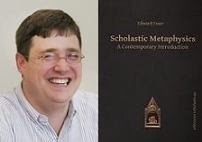Toner and McInerny on Scholastic Metaphysics
 Two new reviews of Scholastic Metaphysics: A Contemporary Introduction. First, in the Spring 2015 issue of the American Catholic Philosophical Quarterly, Prof. Patrick Toner (pictured at left) kindly reviews the book. From the review:
Two new reviews of Scholastic Metaphysics: A Contemporary Introduction. First, in the Spring 2015 issue of the American Catholic Philosophical Quarterly, Prof. Patrick Toner (pictured at left) kindly reviews the book. From the review: This is an excellent little survey of scholastic metaphysics, written more or less from the perspective of “analytic Thomism”…
The refutation of scientism is elegant and thoroughly successful…
Feser explains the rationale behind [the] principle [of causality], distinguishes it from the Principle of Sufficient Reason, and defends it against many objections, including a standard from Hume, as well as more recent worries, from Newton, and from quantum mechanics. Very useful material.Feser next tackles the doctrine of substance, beginning with form and matter, and explaining the difference between substantial and accidental form, among other things. This chapter’s main contribution, in my estimation, is the fine way in which it shows that these notions are not anti-scientific throwbacks only acceptable to the hopelessly medieval…
As an analytic metaphysician, I found the book to be very good. Feser usually does an outstanding job of giving just the right sort of coverage to each topic he treats…
This would be an excellent book to use as a text in an undergraduate or graduate course in metaphysics or natural philosophy…
To sum up: highly recommended. Anyone working in metaphysics, the philosophy of nature, or the philosophy of mind would be well advised to read through this book…
Prof. Toner also has some criticisms. First, he suggests that my treatment of scientism might have been improved by responding to the approach represented by Thomas Hofweber in his essay in the Chalmers, Manley, and Wasserman volume Metametaphysics . That is a good suggestion, and I will plan to write up something on Hofweber. Toner also thinks the treatment of analogy is too brief. In my defense I’d say that here as with other topics it would have been difficult to say more without getting deep into issues lying outside the boundaries of metaphysics proper. For example, to say much more about the metaphysics of biological phenomena would have required an excursus in philosophy of biology and philosophy of nature; and to say much more about analogy would have required an excursus in philosophy of language and logic. But as Toner acknowledges, this is a “judgment call.”
In The Review of Metaphysics, Prof. D. Q. McInerny also very kindly reviews Scholastic Metaphysics. From the review:
One would be hard pressed to find a better introduction to scholastic metaphysics than that provided by Edward Feser. The book is excellently organized, treats its various topics with remarkable thoroughness and depth, and is written in an always clear, precise, and vibrant style. The book could only have been written by someone who has a complete command of the fundamental concepts of scholastic metaphysics, as well as an impressive knowledge of the main currents of modern philosophy. The book is argumentative in the best sense: conclusions are always supported by sturdy premises. Very effective use is made of concrete examples. The book comes accompanied with an ample and informative bibliography. For anyone who seeks a substantive and sound introduction to scholastic metaphysics, this is the book with which to begin.
Published on April 16, 2015 18:05
No comments have been added yet.
Edward Feser's Blog
- Edward Feser's profile
- 326 followers
Edward Feser isn't a Goodreads Author
(yet),
but they
do have a blog,
so here are some recent posts imported from
their feed.



